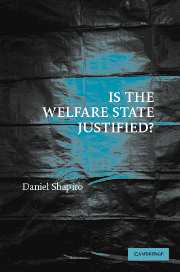Book contents
6 - Welfare or Means-Tested Benefits, Part I
Published online by Cambridge University Press: 12 December 2009
Summary
Introduction
Having completed our examination of the two major social-insurance programs, NHI and SS, and having found MHI and CPP to be superior on the basis of four central viewpoints in contemporary political philosophy (egalitarianism and its prioritarian cousin, positive-rights theory, communitarianism, and the requirement of epistemic accessibility common to many forms of liberalism), we turn our attention to the other major part of the welfare state, namely social assistance or pure welfare programs. Unlike social-insurance programs, which are based (for the most part) on contribution, social assistance or pure welfare programs are based on financial need. The means in means-tested programs usually refers to income, but sometimes income and assets are considered. Examples of social assistance or pure welfare programs are cash benefits for heads of households who have children, housing subsidies, and medical care for the poor or for immigrants, even those who have paid no taxes.
As I noted in previous chapters, the distinction between social insurance and welfare is not sharp. As the example of “free” medical care for those who paid no taxes indicates, virtually all social-insurance programs are supplemented by or contain within them benefits for those who have never contributed. My concern in this chapter is with welfare programs that are relatively independent of social-insurance programs, and thus the main focus here will be on cash benefits for heads of households.
- Type
- Chapter
- Information
- Is the Welfare State Justified? , pp. 198 - 242Publisher: Cambridge University PressPrint publication year: 2007



